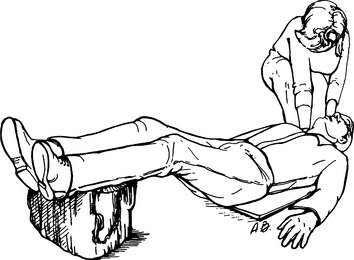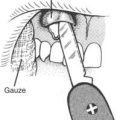SHOCK
Shock is a condition in which the blood supply (which carries oxygen and nutrients) to various organs of the body is insufficient to meet metabolic demands. The signs and symptoms are restlessness, low blood pressure, weak and rapid (thready) pulse, altered mental status (restlessness, anxiety, confusion), moist and cool (clammy) skin, rapid shallow breathing, inability to control urination and bowel movements, nausea, and profound weakness. It is a life-threatening condition and may follow a large number of inciting events. Causes of shock include severe internal or external bleeding (25% to 30% acute loss of an adult’s total blood volume, equivalent to 1.5 to 2 liters out of 6 liters), overwhelming infection, burns, dehydration, heart attack or disease, hormonal insufficiency, hypoglycemia, hypothermia, hyperthermia, allergic reaction, drug overdose, and spinal cord injury (loss of sympathetic nervous system support allows blood vessels to dilate as they lose tone). If shock is caused by blood loss (hemorrhage), the following rough estimates apply:
1. Blood loss of 750 mL to 1 liter corresponds to heart rate (“pulse”) of up to 100 beats per minute and respiratory rate of approximately 14 to 20 breaths per minute. Blood pressure may remain normal.
2. Blood loss of 1 to 1.5 liters corresponds to heart rate greater than 100 and respiratory rate of 20 to 30. Blood pressure is decreased.
3. Blood loss of 1.5 to 2 liters corresponds to heart rate greater than 120 and respiratory rate of 30 to 40. Blood pressure is decreased.
4. Blood loss of greater than 2 liters corresponds to heart rate greater than 130 and respiratory rate greater than 35. Blood pressure is decreased.
1. Position the victim on his back, with the legs elevated about 30 degrees (8 to 12 in or 20 to 30 cm), to encourage blood in the leg veins to return to the central circulation (heart) and head (brain) (Figure 35). Do not elevate the legs if the victim has a severe head injury (see page 61), difficulty breathing, a broken leg, or a neck or back injury, or if such a maneuver causes any pain. If the victim is short of breath because of heart failure (see page 47), he may be more comfortable in the sitting position.
2. Keep the victim covered and warm. Remove him from harsh weather conditions. Remember to insulate him from below. If insufficient bundling is available, lie next to the victim to share body heat. Take special care to keep his head, neck, and hands covered.
3. Administer oxygen (see page 431) at a flow rate of 10 liters per minute by mask.
4. Control any obvious sources of external bleeding (see page 54). Splint all broken bones.
5. If the victim is diabetic, consider a hypoglycemic reaction (see page 142). If the victim is conscious and can purposefully swallow, administer Glutose paste (see page 142) or a sugar-sweetened liquid by mouth in small sips. Otherwise, do not give the victim anything to eat or drink unless he is alert and thirsty or hungry. If the victim is in shock because of diarrhea and dehydration, attempt to initiate oral fluid intake (see page 208).
6. If the victim has been stung by an insect or appears to be suffering an allergic reaction (see page 66), treat the allergic reaction.
7. Transport the victim to a hospital as rapidly as possible.






